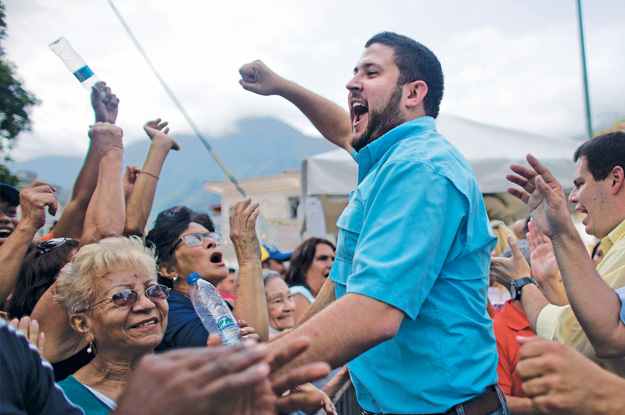
The Captain of Industry | The Musician | The Entrepreneur
The Educator | The Oil Expert | The Politician | The Economist
The Humanitarian | The Rights Advocate | The Foreign Leader
This article is adapted from Americas Quarterly’s print issue on Venezuela after Maduro. | Leer en español
Let’s start with some difficult truths about Venezuela’s opposition: It’s deeply divided, maddeningly inconsistent in its beliefs and tactics, and at times delusional about who might replace Nicolás Maduro, and when. Some of the opposition’s most visible figures remind Venezuelans of their most reviled politicians from the 1980s and 1990s—the corrupt, self-obsessed members of the elite whose actions arguably led to the rise of chavismo in the first place.
In Washington, all this carries a particular cost. While the Trump administration is actively engaged in the anti-Maduro cause, and has imposed new sanctions against the dictatorship, some U.S. officials privately express frustration over what one deemed the opposition’s “total inability to understand reality.” A few even say their office doors are closed until the opposition rallies around a unified leader, or at least a unified strategy.
This is the situation that David Smolansky stepped into last year—and is working to change.
The 32-year-old former mayor of El Hatillo, a municipality of Caracas, was forced into exile in August 2017 after the Maduro regime removed him from his post and ordered his arrest. Following a dramatic escape through Brazil, Smolansky has made Washington his new home and quickly earned a reputation as a modest, thoughtful young leader who is interested in building consensus—as opposed to merely his own brand.
“We have to start preparing now for the day after Maduro leaves, whenever that may be,” Smolansky told AQ in the cubicle where he now works. “That will require a variety of people. You have to build trust. You have to build a network.”
Working in that spirit, he has filled a previously unmet need—talking with other members of the exile community, multilateral organizations, ambassadors from other Latin American countries, and members of the U.S. Congress. While a proud member of Leopoldo López’s Popular Will movement, Smolansky said he meets with “anybody who is in favor of a country with democracy and liberty”— and that Washington provides a unique opportunity to do so, outside of the intense media and social spotlight in Caracas that often makes conversations among different camps difficult.
Click here for a look at who’s who in Venezuela’s opposition
“Look, there can be divergences — we’re trying to be democratic, even when Venezuela is not,” he said. While people focus on the divided opposition, he continued, splits have also been rampant within chavismo, as evidenced by the recent arrest of Maduro’s former intelligence chief, Miguel Rodríguez Torres, among others. Instead of seeking perfect harmony, he said the opposition needs to focus on “basic principles — that we need to focus on a transition to democracy. And I think the majority agrees on that.”
If Smolansky sounds more savvy than most 30-somethings about the politics of exile, it’s because he’s the third consecutive generation of his family forced to seek refuge from totalitarianism. Smolansky’s grandparents fled the former Soviet Union in 1927, while his father left Fidel Castro’s Cuba in 1970.
Like his predecesors’, his escape was risky.
Maduro’s government had already jailed several opposition mayors, including López, when the arrest order came for Smolansky in August. Acting quickly, he shaved his beard and posed as a religious emissary who was crossing the country by car. He passed through 35 military checkpoints — and was searched at four of them, using fake ID to get through. After more than a month in hiding, he secretly crossed into Brazil, where friendly officials were waiting for him. He then flew to Brasília to meet Foreign Minister Aloysio Nunes, who himself spent a decade in France during Brazil’s Cold War-era dictatorship.
“He assured me my exile would be shorter than his,” Smolansky said.
To ensure that’s true, Smolansky is advocating a tough line that includes strengthening sanctions, removing ambassadors in Caracas, and new restrictions on movements of Venezuelan officials who have properties elsewhere in Latin America. He cautions against a U.S. boycott of Venezuelan oil, warning that it might leave China and Russia with increased influence in Caracas, and says a decision to stop selling U.S. gasoline to Venezuela might be more effective.
He also supports expanding the Group of Lima, which currently encompasses 14 countries critical of Maduro’s regime, including Argentina, Chile, Colombia and Mexico. “The world has to understand that Venezuela poses a threat not just to its own citizens, but to millions of other Latin Americans” because of drug trafficking, money laundering and other ills, Smolansky said.
He said Venezuelan society must also mobilize, but acknowledges that’s challenging. The country has a median age of 27, which means the average person was just seven years old when Hugo Chávez first took power, and remembers little else. The key, he said, is to talk to them about inflation, hunger and crime—while mayor, Smolansky presided over an 80 percent decline in kidnappings—and other concrete improvements that could take root under a new government.
“I am part of a generation that doesn’t know what it’s like to live in a free Venezuela,” Smolansky said. “The beautiful thing is that we’re fighting for something we don’t really know.”
To that end, he will continue to be an unofficial ambassador for Venezuelan democracy in Washington. He is a familiar face at the Venezuelan arepa restaurant around the corner from his office, greeted with smiles and hugs by staff and customers alike. “Life in exile has two options,” he reflected. “You can get depressed and never get up, or you can continue with your life and embrace an opportunity for progress, for yourself and your country.”
“Don’t have pity on us,” he said. “What we need is solidarity.”






